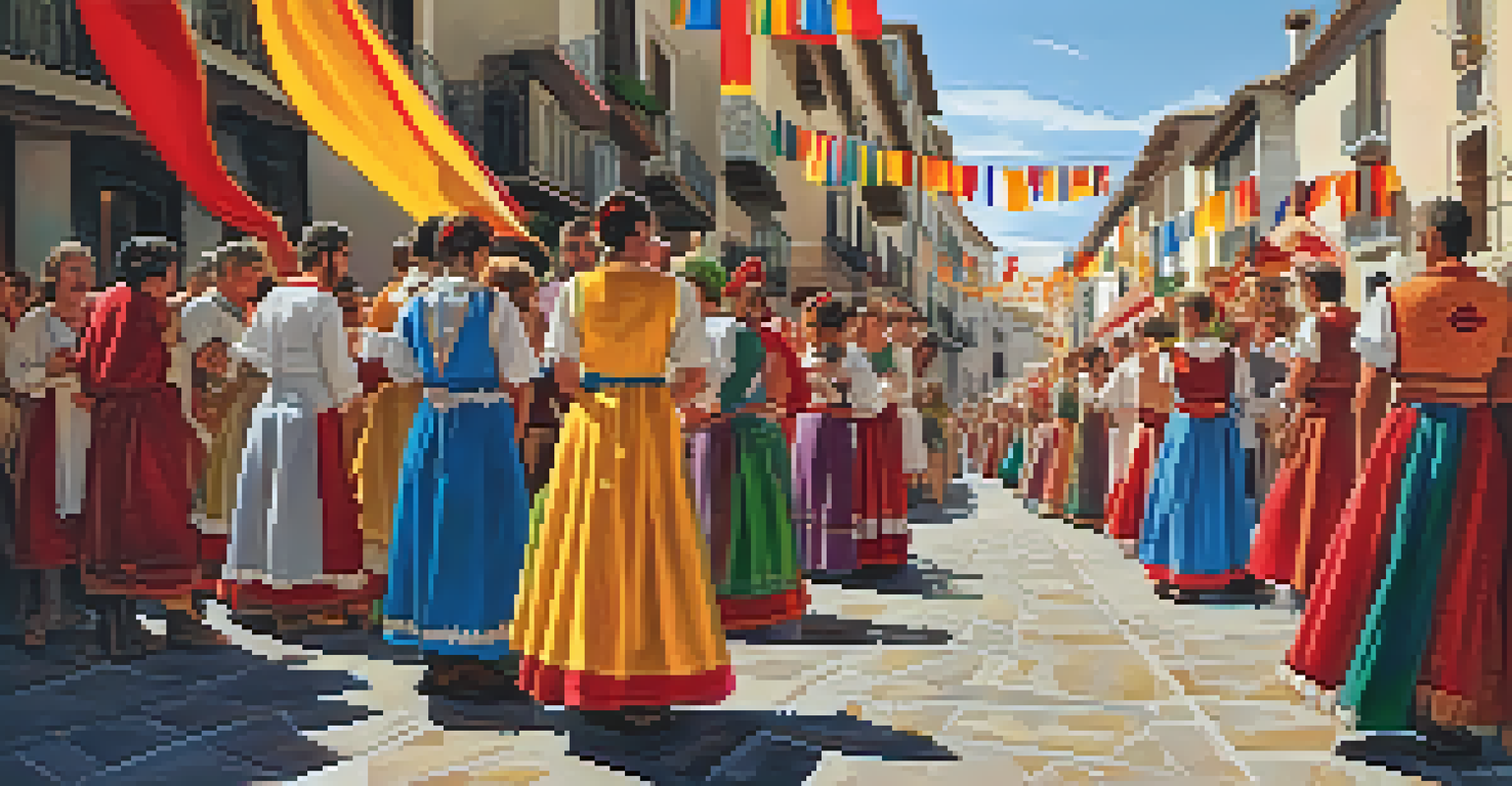Spiritual Tourism Trends: Pilgrimages in Modern Spain

The Rise of Spiritual Tourism in Spain
In recent years, spiritual tourism has gained significant traction in Spain, drawing individuals seeking solace and connection. This trend reflects a growing desire for meaningful travel experiences, where pilgrims embark on journeys that are as much about introspection as they are about exploration. With Spain's rich tapestry of religious history and stunning landscapes, it makes sense that many are flocking to its ancient paths.
The journey is the destination.
Travelers today are looking for more than just picturesque views; they want to engage with the spiritual heritage of a place. Pilgrimages, often seen as traditional, now embrace modern travelers who seek personal growth and enlightenment. This shift creates a unique blend of old and new, where ancient routes are revitalized with contemporary significance.
As people yearn for deeper connections with themselves and the world around them, spiritual tourism offers a pathway to that fulfillment. From famous routes like the Camino de Santiago to lesser-known trails, Spain serves as a backdrop for transformative experiences that resonate on a personal level.
The Camino de Santiago: A Timeless Pilgrimage
The Camino de Santiago remains one of the most iconic pilgrimage routes in Spain, attracting thousands each year. This ancient path, which leads to the shrine of the apostle Saint James in Santiago de Compostela, represents not only a journey but a quest for spiritual renewal. Pilgrims from diverse backgrounds find common ground as they walk, share stories, and connect with both nature and each other.

Walking the Camino offers more than just physical challenges; it provides an opportunity for self-reflection and spiritual discovery. Many travelers report life-changing experiences, finding clarity and purpose along the way. The act of walking, coupled with the breathtaking scenery, allows for a meditative state that enhances the pilgrimage experience.
Spiritual Tourism Grows in Spain
Spain's rich religious history and stunning landscapes are drawing more travelers seeking meaningful, introspective experiences.
With the rise of wellness tourism, the Camino has adapted to meet the needs of modern pilgrims looking for holistic experiences. Various retreats and guided tours now incorporate mindfulness practices, making the journey even more enriching for those seeking a deeper spiritual connection.
Emerging Pilgrimage Routes in Spain
While the Camino de Santiago steals the spotlight, Spain offers a plethora of emerging pilgrimage routes that are gaining popularity. Trails like the Via Francigena and the Camino Mozárabe are becoming sought-after alternatives for those looking to explore lesser-known paths. These routes often provide unique landscapes and cultural experiences, enhancing the spiritual journey.
Travel is fatal to prejudice, bigotry, and narrow-mindedness.
Travelers on these alternative routes can immerse themselves in local traditions and histories, creating a more intimate connection with the regions they traverse. Each path tells its own story, often rooted in centuries of faith and devotion, which adds layers of meaning to the pilgrimage experience. This exploration of new routes invites a diverse range of participants, from seasoned pilgrims to curious tourists.
As awareness grows, so do the resources available for these emerging routes, including guidebooks, apps, and organized tours. This accessibility allows pilgrims to embark on their spiritual journeys with confidence, knowing they have support along the way.
Spiritual Retreats: A Complement to Pilgrimages
In addition to traditional pilgrimages, spiritual retreats are becoming increasingly popular among those seeking a deeper connection to themselves and their spirituality. These retreats often combine mindfulness practices, meditation, and the exploration of local spirituality. They serve as a complement to the physical journey, providing a space for reflection and personal growth.
Spain is home to numerous spiritual retreat centers, often situated in tranquil locations that enhance the experience. From the serene hills of Andalusia to the coastal beauty of Galicia, these retreats offer participants an opportunity to disconnect from the chaos of daily life and reconnect with their inner selves. This combination of retreat and pilgrimage creates a holistic approach to spiritual exploration.
Camino de Santiago's Enduring Appeal
The Camino de Santiago remains a top pilgrimage route, offering personal growth and spiritual discovery through its breathtaking scenery.
Many retreats also incorporate elements of local culture and spirituality, allowing individuals to engage with the community on a deeper level. This interplay between personal introspection and communal experience enriches the overall journey, making it a transformative adventure.
The Role of Technology in Modern Pilgrimages
As we embrace the digital age, technology plays a crucial role in shaping modern pilgrimages. From mobile apps that provide route information to online communities where pilgrims share their experiences, technology enhances the journey in various ways. It helps individuals navigate their paths while fostering a sense of belonging among fellow travelers.
Social media has also transformed how pilgrims document and share their journeys. Many use platforms like Instagram and Facebook to share their experiences, inspiring others to embark on similar paths. This visibility not only promotes spiritual tourism but also creates a supportive network for those seeking guidance and encouragement during their travels.
However, while technology offers numerous benefits, it's essential for pilgrims to maintain a balance between the digital and physical experiences. Embracing the journey's simplicity allows for a more profound connection with the spiritual aspects of the pilgrimage.
Cultural Significance of Pilgrimages in Spain
Pilgrimages in Spain are steeped in cultural significance, reflecting the country's diverse history and spiritual heritage. Many routes are linked to specific festivals and traditions, creating a rich tapestry of experiences for pilgrims. These cultural elements not only enhance the journey but also provide insight into the communities along the way.
As pilgrims travel, they encounter vibrant local customs, delicious cuisine, and warm hospitality. This cultural immersion enriches their experiences and fosters a deeper appreciation for the regions they visit. Pilgrimages, therefore, become not just a spiritual journey but also an exploration of Spain's multifaceted identity.
Emerging Routes and Retreats
New pilgrimage routes and spiritual retreats are emerging, allowing travelers to explore local cultures while fostering deeper spiritual connections.
The blending of spirituality and culture makes these journeys memorable and transformative. By engaging with local traditions, pilgrims contribute to the preservation of these customs, ensuring they continue to thrive for future generations.
Future Trends in Spiritual Tourism in Spain
As spiritual tourism continues to evolve, several trends are likely to shape its future in Spain. One notable trend is the increasing focus on sustainability and responsible travel, as more pilgrims seek to minimize their environmental impact while on their journeys. This emphasis on eco-friendly practices aligns with the spiritual ethos of many pilgrims, allowing them to travel mindfully.
Additionally, the integration of wellness tourism into spiritual journeys is set to grow. Retreats and pilgrimage combinations that focus on mental, emotional, and physical well-being will attract a broader audience. This holistic approach to travel resonates with those seeking a deeper, more balanced experience during their journeys.

As Spain's spiritual tourism landscape evolves, it will continue to attract seekers from around the world, each looking for their own path to enlightenment. The enduring appeal of pilgrimages, combined with modern amenities and a focus on sustainability, ensures that these sacred journeys will remain relevant for generations to come.